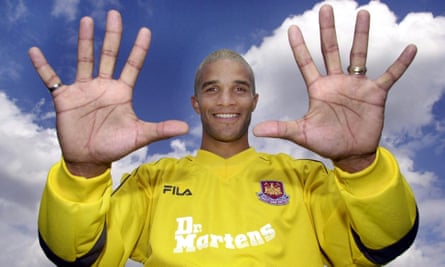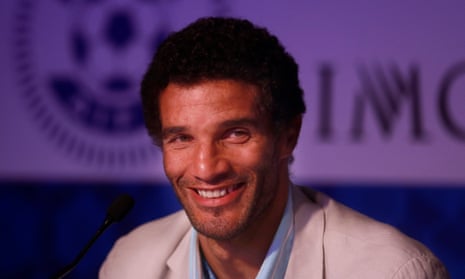David James describes the situation as complicated. He had not signed Dimitar Berbatov, rather he inherited him midway through the 2017-18 Indian Super League season after he took charge of Kerala Blasters for his first job in full-time management.
The former England goalkeeper chooses his words carefully but it does not take a detective to decipher the subtext, which talks to the perception of Berbatov as a high‑maintenance stroller, for whom the finer things are the only things that matter.
“I had a plan of how I was going to do things and equality underpinned everything,” James says. “I didn’t have superstars or gophers in the team. Everybody got treated the same. And that doesn’t always work.”
According to James, Berbatov was approaching the end not only of his one-season contract but of his career – although he did not recognise that, which was another problem. Furthermore, fitness and speed are key in Indian football and Berbatov was struggling with the former and never really had the latter.
Come the season’s last game, with Kerala out of the play-off picture and James looking ahead to the following campaign, he did not select the Bulgarian. Have a guess how that went down? Berbatov would never play again professionally.
“He wasn’t so happy not to be involved in that last match, which is fine,” James says. “I had been in his position. It’s not a nice place to be when you think you’ve still got one more game or one more season left in you. We coped. We got him fitter. But it was difficult. Character types, he’s not the sort of guy who I would be drawn towards, although I had a lot of empathy with him.
“Wes Brown was with us as well and he was amazing. They’d show Premier League games on the TV and Wes used to have a community in his bedroom of the players just watching games, night after night. Bought into it 100%. Fantastic.
“It was an interesting time. Good time in one sense, a lot of learning. But with regards to Dimitar, funnily enough I saw him last year. We played in a game in Singapore. I said hello.” James pauses abruptly, allowing the deadpan delivery of that last line to take effect. “He tried to score past me but he didn’t, so I was quite happy with winning that one.”
Dundee United's glory years under Jim McLean: part one of two
James had been the player-manager at Kerala in 2014, when the ISL season was jammed in between October and December, and his team reached the play-off final. When he returned in January 2018 to replace the sacked René Meulensteen it was a popular appointment and things went well at first. James steadied a listing ship, winning five and drawing three of 11 games to earn a three-season contract extension.
But, before the new campaign in late September, things had changed. Kerala was hit by devastating floods in August and, quite apart from the loss of life, the local economy was hurt, which had repercussions for the football club. “We were hamstrung by financial situations and a lot of issues,” James says.
The 49-year-old had a hard time with how things were communicated in terms of the schedule for the season. “We didn’t know when it was going to start six weeks before it started,” he says. “Also, India had qualified for the AFC Asian Cup [in January 2019] so they had a five-week break in the middle of the season [from mid-December], which we didn’t know about at the beginning of the season.”
James gives the impression of chaos. He had a three-year plan but it was over after three months. His sacking was announced at the start of the mid-season break after one win in 12 matches. James had previously rolled with the punches, including those from Berbatov. Now, they were too much.
“You can get damaged,” he says. “The experience in India was quite damaging because I knew what I set out to do. In a different world, with understanding of what was coming up, I think things would have been set out in a different way.”

James was happy in India and Asia more broadly, where he had done a good deal of travel and TV punditry work. He was ready to move there permanently and he says he had not thought about British football or getting a job in management here. That has changed. He has been back at home for a year or so – he entered Strictly Come Dancing last September – and the Covid-19 lockdown has brought a clarity of thought and renewed purpose. The wounds from Kerala appear to have healed.
“I will be applying for jobs. I want to be a manager. I want to be back in there and give it a go.
“I love doing punditry work but the pundit doesn’t change anything. And I love change. I love the opportunity of being able to be successful. I can’t do that as a pundit. I might come out with a line that everybody goes: ‘Wow, that’s amazing,’ but it’s not going to change anything. Whereas managing or being involved at any level … there is an opportunity. So, yes, I am hungry again.”
The issue of black, Asian and minority ethnic representation in British football coaching and management burns uncomfortably but James, who has taken all of his badges – he got the Uefa pro licence in June 2018 – continues to wonder whether there are enough people from such backgrounds signing up to the courses. In 2012, he courted controversy when he said the lack of opportunity was not down to racism but low BAME attendance on the requisite coaching programmes.
“The difficulty is that if the qualification [in terms of numbers] isn’t reflective of equality, then the chances of the outcome being reflective are even more difficult,” he says. “On my pro licence, I did ask the question: ‘How many BAME coaches had passed the A or pro licences?’ And that information wasn’t available. When you apply, you don’t have to state your ethnic background, which is right. It’s a qualification, not a race thing.”
James also worries the pro licence is not graded, they merely pass. “If you had a group of people with high grades not getting positions, then you ask the question. At the moment, it’s very loose in many different contexts. I navigate around statistics and without the proof of statistics, it’s difficult.”
James has not previously applied for a job in Britain. “So, as a pro licence holder, am I part of the problem?” he says. That is about to change and James is optimistic about his next chapter.
“I struggle to find a scenario where my ethnicity has hampered my career. That may purely be because my physical attributes are enough and they satisfied whatever was needed. People might just say I am a bad manager, in which case I can’t really argue, but at least I’m going to put myself in a position to find out. It will be down to me as a person rather than anything else.”
David James is supporting #PinYourThanks – a volunteer-led initiative allowing people across the UK to give thanks, in the form of a pin badge, to those who have supported them during this challenging time. The collection includes unique designs from James, Keira Knightley and Ringo Starr. Profits from the scheme go to Volunteering Matters and NHS Charities Together. Visit www.pinyourthanks.org
